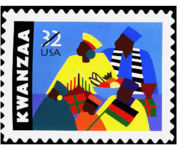Kwanzaa: 7 Day Pan-African Festival
Cats: Heart of the Holidays, Kwanzaa, Tips & Trivia| Kwanzaa:
Kwanzaa:
7 Day Pan-African Festival
Kwanzaa (or Kwaanza) is a week-long Pan-African festival primarily honoring African-American heritage. It is observed from December 26 to January 1 each year, almost exclusively in the United States of America.
Kwanzaa consists of seven days of celebration, featuring activities such as candle-lighting and pouring of libations, and culminating in a feast and gift-giving. It was created by Ron Karenga, and first celebrated from December 26, 1966, to January 1, 1967. Karenga calls Kwanzaa the African American branch of "first fruits" celebrations of classical African cultures.
The name Kwanzaa derives from the Swahili phrase "matunda ya kwanza," meaning "first fruits." The choice of Swahili, an East African language, reflects its status as a symbol of Pan-Africanism, especially in the 1960s, though most African-Americans have West African ancestry.
 1997 began celebrating Kwanzaa as "A Celebration of Family, Community, and Culture." The first Kwanzaa stamp was issued by the United States Postal Service on October 22 at the Natural History Museum in Los Angeles, California. In 2004 a second Kwanzaa stamp, created by artist Daniel Minter was issued which has seven figures in colorful robes symbolizing the seven principles.
1997 began celebrating Kwanzaa as "A Celebration of Family, Community, and Culture." The first Kwanzaa stamp was issued by the United States Postal Service on October 22 at the Natural History Museum in Los Angeles, California. In 2004 a second Kwanzaa stamp, created by artist Daniel Minter was issued which has seven figures in colorful robes symbolizing the seven principles.
- Umoja (Unity) To strive for and to maintain unity in the family, community, nation and race.
- Kujichagulia (Self-Determination) To define ourselves, name ourselves, create for ourselves and speak for ourselves.
- Ujima (Collective Work and Responsibility) To build and maintain our community together and make our brothers’ and sisters’ problems our problems and to solve them together.
- Ujamaa (Cooperative Economics) To build and maintain our own stores, shops and other businesses and to profit from them together.
- Nia (Purpose) To make our collective vocation the building and developing of our community in order to restore our people to their traditional greatness.
- Kuumba (Creativity) To do always as much as we can, in the way we can, in order to leave our community more beautiful and beneficial than we inherited it.
- Imani (Faith) To believe with all our heart in our people, our parents, our teachers, our leaders and the righteousness and victory of our struggle.
For items to purchase that celebrate Kwanzaa, go to WomenRisingNow.com
For more detailed information, go to: Wikipedia.

November 13th, 2008 at 3:49 pm
My simple defense of Kwanzaa is that in the short time that we celebrated the holiday, it brought my family together. We weren’t hitting the after-Christmas sales or trying out our new bicycles. We were kneeling around an altar and watching as the water ran from the jug in my brother’s hands.
—Melonyce McAfee